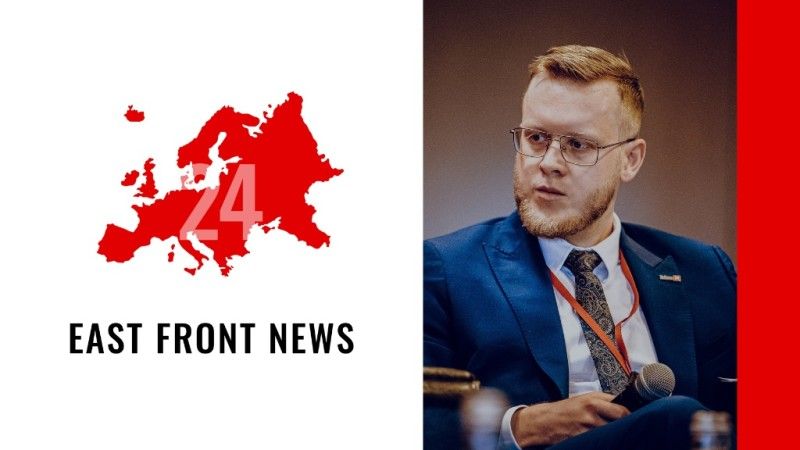Geopolitics
East Front News 3#: Cyber Attacks, the Role of the U.S., and National Strategy in Poland

East Front News is a weekly newsletter summarizing the past week’s most important events concerning security and the situation in the Central and Eastern Europe region. It includes original opinions and comments, along with key news items significant from a Polish perspective. If you would like to receive this newsletter, please sign up by clicking
DDoS Attacks on Critical Infrastructure in Poland
Since the beginning of the war in Ukraine, Poland has been regularly targeted by cyber-attacks. On July 15, the pro-Russian group NoName057(16) conducted another series of attacks. The targets included entities such as PPHU Ekolot, PZL Mielec, Gdańsk Lech Wałęsa Airport, Rzeszów-Jasionka Ulm Family Airport, and the websites of Polish highways. In their statement, the cybercriminals claimed the attacks were in response to the Polish government’s proposal to shoot down Russian missiles over Ukrainian territory heading towards Poland. Additionally, the cyberattack was a reaction to the recently signed security agreement between Poland and Ukraine, as well as the agreements made at the NATO summit, where parties agreed to continue supporting Ukraine. Cyber-attacks are expected to continue in the coming weeks.
Vice President J. D. Vance and the Eastern Front
The likelihood of Donald Trump being elected President of the USA is increasing. From Poland’s perspective, the situation appears favorable, as it has maintained contacts with both presidential candidates through the president, prime minister, and ministries. Regarding Vance, a different perspective on the Eastern Front is observed in Warsaw. The potential vice president voted against aid packages for Ukraine and believes Kyiv does not have the right to win the war against Russia. Furthermore, he advocates for the Europeanization of the Old Continent’s security, although he does not suggest a complete withdrawal of US Armed Forces from Europe. Vance emphasizes the significance of Moscow’s distinct interests and focuses on the threat in the Indo-Pacific. This stance from the vice president poses significant challenges for the rearmament of Ukraine, potentially undermining stability and security in NATO’s eastern flank countries.
Armenian-American Military Exercises
The growing cooperation with Armenia is very interesting. Trade with the European Union is increasing, France is establishing a military presence, the USA has decided on joint exercises, and a ministerial delegation from Yerevan attended Defence24Days in Poland in May. This week, Armenia began joint military exercises with the USA („Eagle Partner”), which will last until July 24. The maneuvers aim to increase the interoperability of units participating in international peacekeeping missions. The continued strengthening of relations with the collective West goes hand in hand with cooling relations between Yerevan and Moscow, as indicated by Prime Minister Nikol Pashinyan, who claims that Armenia will leave the CSTO in due course. Central Asia and the Caucasus are regions where Russia is expected to lose influence, recognizing the Kremlin’s imperial policy.
Changes in the Counter-Hybrid Operation of the Polish Armed Forces
The Polish Ministry of Defence has announced substantial changes in the conduct of the counter-hybrid operation that the Polish Armed Forces are conducting on the border with Belarus. While since 2021 there were two separate operations, one as a direct support to the Border Guard and one formally named as a separate training effort, now they will be combined into one operation named „Bezpieczne Podlasie”. In total, as many as 17 thousand soliders of the Polish Armed Forces will be taking part, but slightly more than half of them will remain at high readiness at home stations, so that they continue normal training. The number of soliders engaged in protection against a hybrid threat of weaponized migration from Belarus is much more than the Border Guard and Police personnel engaged there combined, even if formally the Border Guard is in charge of protecting the border while the Armed Forces only provide assistance. The Polish authorities said that now the number of attempted illegal border crossings was reduced by over 50 percent due to an established buffer zone, yet in the social media information on succesfull crossings are still being published, and the operation at the border is a significant burden over the Polish Armed Forces. The MoD has declared that it will improve the equipment of the forces at the border, including purchasing additional individual equipment as well as vehicles and detection systems. The efforts to improve equipment at the border go simultaneously with preparation of a larger, military support system named „Tarcza Wschód” (Eastern Shield).
New Polish National Security Strategy Guidelines
The Polish National Security Bureau has published new guidelines for the National Security Strategy. Of course, while the Russian aggression is seen as a major threat, including in the context of the Russian aggression against Ukraine, threats from Belarus (including hybrid), but also North Korea and Iran are mentioned as well. The document also highlights instability in the Middle East and Asia-Pacific. Polish Armed Forces, Membership in NATO and EU as well as ties with US are seen as pivotal to the security of Poland, while a call is being made at NATO Allies to increase their defence budgets to GDP 4%. According to the Strategy, to provide appropriate security level and ensure Polish Armed Forces have appropriate capabilities, defence spending at the level of GDP 4% or above is necessary, as well as expanding Polish air defence, counter-surprise capabilities and munitions stock/sustainment. At the same time, Polish Armed Forces need to improve the personnel management, C2, and certain lower-level strategic documents including the Defence Strategy are to be updated. Last but not least, Poland should expand its defence industrial capabilities, also with a view on R&D exports, while the defence industry should also obtain a capability to act during wartime.
East Front News is a weekly newsletter and article on Defence24.com summarizing the past week’s most important events concerning security and the situation in the Central and Eastern Europe region. It includes original opinions and comments, along with key news items significant from a Polish perspective.
Jakub Palowski, Deputy Ed. in Chief & Aleksander Olech, PhD
